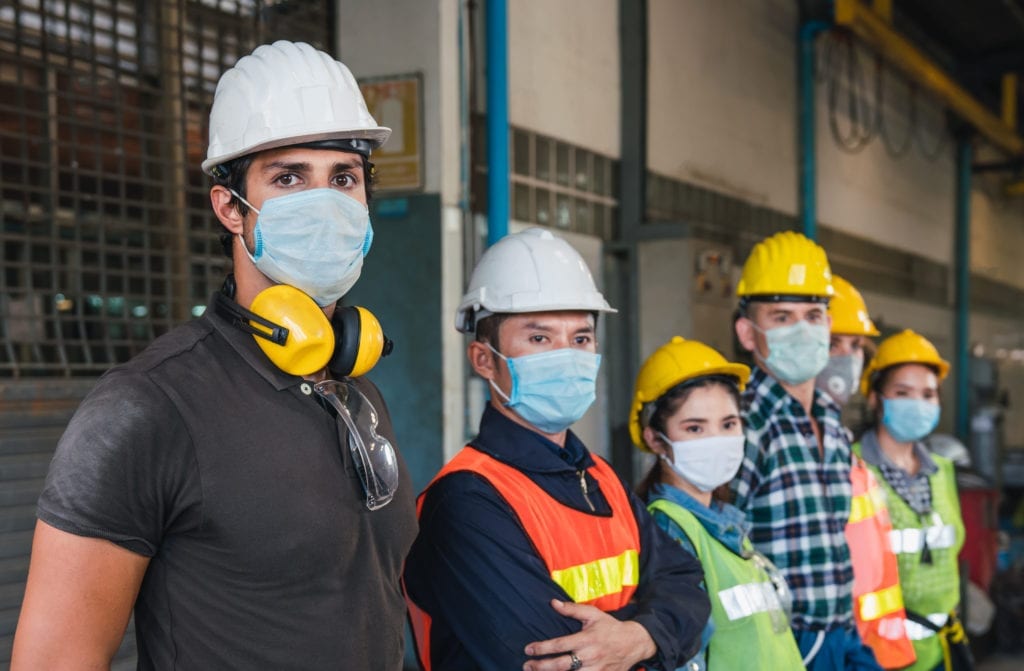In these uncertain times, Illinois employees may have some legal protections from discrimination or retaliation related to the coronavirus pandemic. A wrongful termination in violation of certain Illinois or federal laws can be financially devastating. Many of these federal and Illinois laws already exist. Some laws like the City of Chicago’s Coronavirus Anti-Retaliation Ordinance were recently passed. Here is a summary of some, but not all of the Illinois and federal laws that may provide some level of protection from wrongful termination or adverse employment action related to the coronavirus pandemic.

City of Chicago’s Coronavirus Anti-Retaliation Ordinance
Effective July 1, 2020, the City of Chicago passed a Coronavirus Anti-Retaliation Ordinance preventing employers from retaliating against employees for obeying a quarantine order, isolation order, or other order from public authorities having to do with COVID-19. This Ordinance shall be repealed when the Commissioner of Public Health makes a written determination that the threat to public health posed by COVID-19 has diminished to the point that this Ordinance can be safety repealed.
Employers and Employees covered by the City of Chicago’s Coronavirus Anti-Retaliation Ordinance
Covered employers are any individuals or businesses maintaining a business facility within the geographic boundaries of the City of Chicago or those businesses that are subject to at least one of the City of Chicago’s licensing requirements.
Covered employees is any employee who, in any particular two-week period, performs at least two hours of work for an employer while physically present within the geographical boundaries of the City of Chicago. For the purposes of this definition, time spent traveling in the City that is compensated time, including, but not limited to, deliveries, sales calls, and travel related to other business activity taking place within the geographical boundaries of the City; however, time spent traveling in the City that is uncompensated commuting time shall not constitute work while physically present within the geographic boundaries of Chicago. The Ordinance does exclude some categories of “covered employees.”
Types of Protected Activity:
The Ordinance imposes a duty on employers to allow employees to obey public health orders. Under the Ordinance, an employer shall not take adverse action against a covered employee for obeying an order issued by the Mayor, the Governor of Illinois, the Chicago Department of Public Health, or, in certain circumstances a treating healthcare provider, requiring the covered employee to:
- Stay home to minimize the transmission of COVID-19;
- Remain at home while experiencing COVID-19 symptoms or sick with COVID-19 (An employer may request certification after the employee is absent for more than three consecutive workdays);
- Obey a quarantine order issued to the covered employee (an employer may request certification after the employee is absent for more than three consecutive workdays);
- Obey an isolation order issued to the covered employee (an employer may request certification after the employee is absent more than three consecutive workdays);
- Obey an order issued by the Commissioner of Health regarding the duties of hospitals and other congregate facilities.
Under the Ordinance, an employer cannot take adverse action against a covered employee for caring for an individual subjected to:
- Stay at home to minimize the transmission of COVID-19;
- Remain at home while the individual is experiencing COVID-19 symptoms or sick with COVID-19;
- Obey a quarantine order issued to the individual.
“Individual” is defined as someone who lives in the same residence as the covered employee. An employer may request certification pursuant to the subsection and order to which the individual being cared for is subject, as outlined in the policy document.
Types of Retaliation Prohibited:
The type of retaliation or adverse employment action prohibited means being unjustly fired or terminated, unjustly denied a promotion, unjust negative evaluations, punitive schedule changes, punitive increases in the desirability of work assignments, and other kinds of harassment as a result of the worker’s protected activity described above obeying a COVID-19 related order.
Covered Employer Defenses:
Nothing in the Anti-Retaliation Ordinance limits the ability of a covered employer to take legitimate business action with respect to a covered employee. This means that a covered employer still has the ability to take adverse employment action against its employee for legitimate non-discriminatory or non-retaliatory reasons.
Article I, Section 2(c) provides that it shall be an affirmative defense to a violation of this Section that an employer relied on a reasonable interpretation of an order and, upon learning of the violation of this Section, cured the violation within 30 days.
Covered Employee’s Right of Civil Action and Damages:
A covered employee suffering discrimination or retaliation in violation of the City’s Coronavirus Anti-Retaliation Ordinance may bring a civil action against his/her covered employer seeking reinstatement to the same or equivalent position, damages equal to three times the full amount of damages directly caused by the retaliatory action, as well as costs and reasonable attorney’s fees as a court allows.
A covered employee suffering discrimination or retaliation in violation of this Ordinance may file a complaint with the Office of Labor Standards, Department of Business Affairs and Consumer protection, in one of three ways:
- Call 311;
- Download and mail a complaint form to the Office of Labor Standards, Department of Business Affairs and Consumer Protection, 121 N. LaSalle Street, City Hall, Room 805, Chicago, IL 60602.
- Email the complaint to the Office of Labor Standards at bacplaborstandards@cityofchicago.org.
If you are not covered by the City of Chicago’s Coronavirus Anti-Retaliation Ordinance, you may have other coronavirus anti-retaliation protections in certain limited circumstance under other Illinois or federal laws.

Illinois Whistleblower Act
The Illinois Whistleblower Act may provide coronavirus anti-retaliation protections against employers who retaliate against employees because the employee engaged in certain protected activities listed in the statute. The Illinois Whistleblower Act protects most Illinois employees who engage in the following protected activities from retaliation:
- Discloses information in a court, an administrative hearing, or a legislative hearing, or in any other proceeding, where an employee has reasonable cause to believe that the information discloses a violation of a State or federal law, rule, or regulation;
- Discloses information to a government or law enforcement agency, where the employee has a reasonable cause to believe that the information discloses a violation of a State or federal law, rule, or regulation; or
- Refuses to participate in an activity that would result in a violation of a State or federal law, rule, or regulation.
A public employee employed by a municipal or county government employer who discloses information to a management employee with authority to correct the alleged violation of State or federal law, rule, or regulation may have protection under the Illinois Whistleblower Act. A private employee would likely need to report the alleged violation to a law enforcement agency or government agency to engage in protected activity under the Whistleblower Act.
For example, protected activity under the Illinois Whistleblower Act may include reporting an employer’s violations of the 77 Ill. Adm. Code 690.50 requiring businesses to require its employees and customers to wear a face coverings to the Illinois Department of Public Health or law enforcement agencies.
Illinois Common Law Retaliatory Discharge Claims
An employee terminated because he or she internally reported to management or a government agency his employer’s violation of a coronavirus statute or regulation protecting the health or safety of the public may have an Illinois common law retaliatory discharge claim. For example, an employee terminated because he or she reported to management violation of The Illinois regulation, 77 Ill. Adm. Code 690.50 requiring employees and customers to wear face coverings may support a wrongful termination claim.
Illinois Nursing Home Care Act – Whistleblower Protections
The Illinois Nursing Home Care Act – Whistleblower Protections offer nursing home employees with broad coronavirus anti-retaliation protections for engaging in three board type of protected activity:
- Disclosing or threatening to disclose to a supervisor or to a public body an activity, inaction, policy, or practice implemented by a facility that the employee reasonably believes is in violation of a law, rule, or regulation;
- Providing information to or testifying before a public body conducting an investigation, hearing, or inquiry into any violation of law, rule, or regulation by a nursing home administrator;
- Assisting or participating in a proceeding to enforce the provisions of this Act.
Illinois Nursing Home Regulations, 77 Ill. Adm. 300.340(a)(2), effective until March 21, 2021 adopts certain CDC guidelines such as Preparing for Covid-19 in Nursing Homes and Responding to Coronavirus (Covid-19) in Nursing Homes. Reporting violations of these CDC Guidelines adopted by The Illinois Regulations may provide a nursing home employee suffering from retaliation with a cause of action.
Retaliatory Discharge for Seeking Worker’s Compensation Benefits for Coronavirus Infection at Work.
On June 5, 2020, a bill was signed creating a rebuttal presumption of worker’s compensation coverage for first responders and front-line workers exposed to COVID-19. The Illinois Worker’s Compensation Act, 820 ILCS 305(h) prohibits employers from firing employees in retaliation for exercising their rights to worker’s compensation benefits for who become infected with COVID-19 at work. Illinois common law retaliatory discharge claims offer coronavirus anti-retaliation protection to employees fired in retaliation for seeking work’s compensation benefits for coronavirus infections while working.

The Hospital Report Card Act – Whistleblower Protections.
The Whistleblower Protections may offer hospital employees some coronavirus anti-retaliation protections for any of the following protected activities:
- Disclosing to nursing staff supervisor or manager, a private accreditation organization, the nurse’s collective bargaining agent, or a regulatory agency any activity, policy, or practice of a hospital that violates this Act or any other law or rule or that the employee reasonably believes poses a risk to the health, safety, or welfare of the public;
- Initiates, cooperates, or otherwise participates in an investigation brought by a regulatory agency or private body concerning matters covered by this Act or any other law or rule or that the employee reasonably believes poses a risk to health, safety, or welfare of a patient or the public;
- Objects or refuses to participation any activity, policy, or practice of a hospital that violates this Act or any law or rule of the Department or that a reasonable person would believe poses a risk to the health, safety, or welfare of a patient or the public.
- Participates in a committee or peer review process or files a report or complaint that discusses allegation of usage, dangerous, or potentially dangerous care within the hospital.
The Whistleblower Protections under this statute may require the aggrieved employee to give written notice to the hospital of the activity, policy, practice, or violation that the employee believes poses a risk to the health of a patient or the public and provide the manager with a reasonable opportunity to correct the problem. The written notice provision of the statute may not apply the activity, policy, or practice, or violation places patient health or safety in severe and immediate danger.

These Whistleblower Protections may provide nurses employed at hospitals with coronavirus anti-retaliation protections for reporting their employer’s violations of COVID-19 protections. Additionally, other claims under the Illinois Whistleblower Act and Illinois common law retaliatory discharge may provide some protections.
Surface Transportation Assistance Act – Whistleblower Protections

Truck drivers and commercial bus drivers who become infected with COVID-19 may have coronavirus anti-retaliation protections under the Surface Transportation Assistance Act for refusing to drive in violation of 49 C.F.R. 392.3 when their ability or alertness is so impaired or likely to be impaired through illness as to make it unsafe to begin or continue to operate a commercial motor vehicle.
Brian J Graber LLC, is a Chicago wrongful termination lawyer representing employees who are retaliated against in violation of Illinois and federal law. If you believe you were fired in violation of Illinois or federal law, contact Brian J Graber LLC, at (312) 291-4648 for a free consultation. Each case is different and requires a detailed legal analysis of the facts to determine whether or not a claim exists.

 Illinois Human Rights Act Protects All Employees.
Illinois Human Rights Act Protects All Employees.